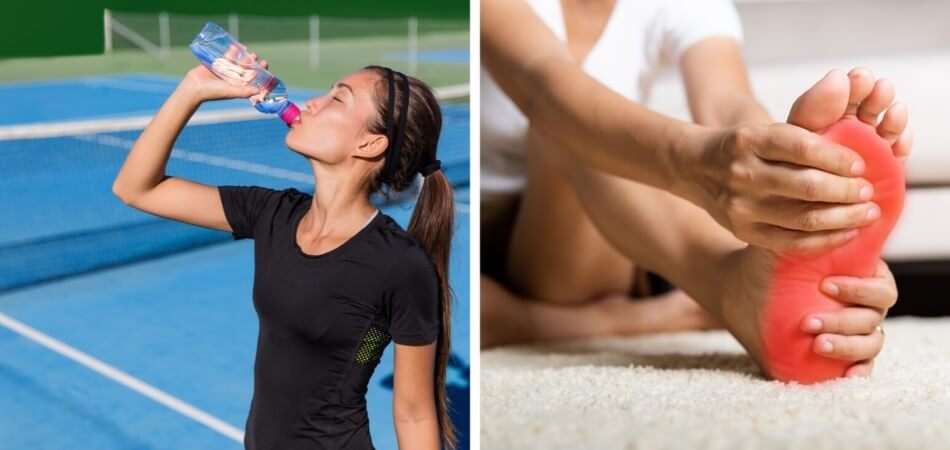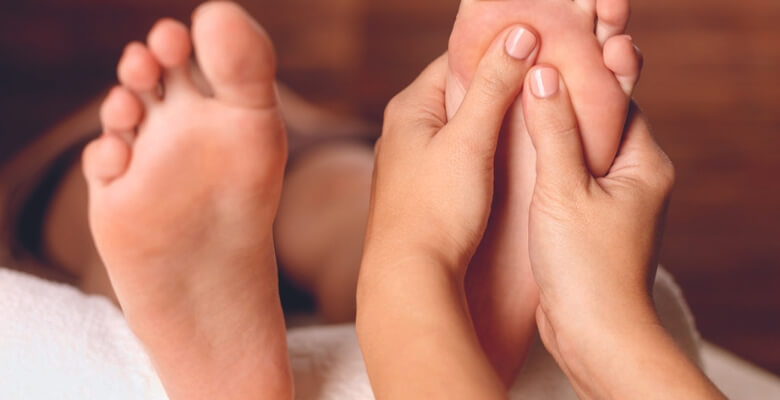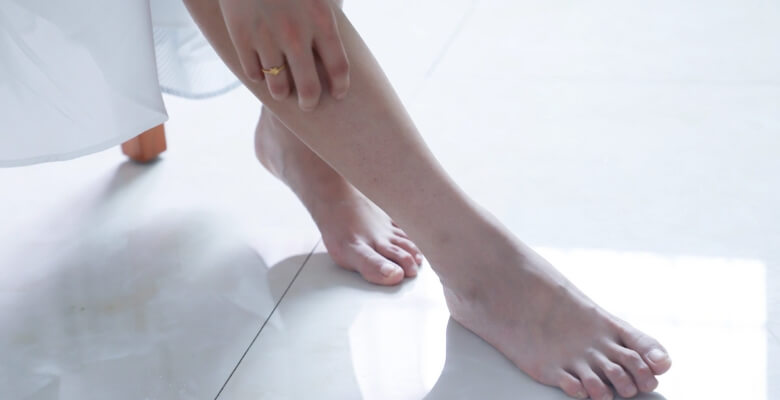The pain in our feet can affect our daily activities, from walking to simply standing. Is the problem caused by something other than strained muscles or ill-fitting shoes? This brings us to the question: Can dehydration cause foot pain?
Yes, dehydration can cause foot pain. Muscle cramps and spasms in the feet can occur when the body lacks sufficient water. Having a dehydrated body can also cause discomfort and soreness in the extremities. The importance of maintaining proper muscle function and preventing foot pain cannot be overstated.
This blog explores the connection between dehydration and foot pain, offers practical prevention and relief tips, and explores the signs to watch for. Taking care of our feet will keep them happy and healthy!
What is Dehydration?
The importance of keeping your body properly hydrated cannot be overstated. Dehydration occurs when your body loses more fluids than it takes in, leading to an imbalance in electrolytes and essential minerals.

This imbalance can result from various factors such as excessive sweating, vomiting, diarrhea, or simply not drinking enough fluids. When you’re dehydrated, your body struggles to perform its normal functions efficiently, impacting everything from cognition to muscle function.
Common symptoms include thirst, dry mouth, fatigue, and dark-colored urine. Severe dehydration can be dangerous and requires prompt medical attention. That’s why maintaining proper hydration levels is crucial, not just for your body but also for your feet.
Socks products like My-Happy Feet socks are designed to keep your feet healthy and happy, staying hydrated becomes even more manageable. So, drink up and take care of your body it’s the only one you’ve got!
Can Dehydration Cause Foot Pain?
Yes, dehydration can indeed cause foot pain. When your body lacks sufficient hydration, it affects various bodily functions, including circulation. Poor circulation can lead to reduced blood flow to the extremities, such as the feet, resulting in discomfort and pain.

Fluid Balance and Tissue Health
Fluid balance is crucial for maintaining the health of your tissues, including those in your feet. When you’re dehydrated, there’s a decrease in the amount of fluid available to lubricate and cushion your joints and muscles. This can result in increased friction and pressure on the tissues, leading to pain and discomfort.
Muscle Cramps and Strain
Dehydration can also contribute to muscle cramps and strain, which can manifest as foot pain. When you’re dehydrated, the electrolyte balance in your body is disrupted, affecting muscle function. This can lead to involuntary muscle contractions and spasms, causing pain and stiffness in your feet.
Impact on Joint Function
Hydration plays a crucial role in maintaining the elasticity and lubrication of your joints. When you’re dehydrated, the cartilage in your joints may not receive adequate moisture, leading to increased friction and wear. This can result in joint pain, including in the feet, especially during weight-bearing activities.
Circulation and Tissue Repair
Proper hydration is essential for maintaining optimal blood circulation throughout your body, including your feet. When you’re dehydrated, blood flow to your extremities may be reduced, affecting tissue repair and regeneration. This can prolong recovery from injuries and exacerbate existing foot pain.
How to Avoid Dehydration – Related Foot Issues?
The health of your feet depends on staying hydrated. There are practical steps you can take to prevent foot issues caused by dehydration.

Drink Plenty of Fluids
Ensure you drink an adequate amount of water throughout the day to maintain proper hydration levels. Opt for water as your primary beverage and limit consumption of dehydrating drinks like alcohol and caffeinated beverages.
Monitor Urine Color
Pay attention to the color of your urine; it should be pale yellow, indicating proper hydration. Dark yellow urine may be a sign of dehydration, prompting you to increase your fluid intake.
Balance Electrolytes
Incorporate electrolyte-rich foods and drinks into your diet to maintain electrolyte balance. Foods like bananas, oranges, and coconut water can help replenish electrolytes lost through sweating.
Hydrate Before Exercise
Drink water before engaging in physical activity, especially if it’s intense or prolonged. Hydrating beforehand helps ensure your body has enough fluid to support optimal performance and recovery.
Take Breaks and Rest
During extended periods of activity, take regular breaks to hydrate and give your feet a chance to rest. This can help prevent overexertion and reduce the risk of dehydration-related foot issues.
Wear Breathable Footwear
Choose footwear made from breathable materials that allow air circulation to prevent excessive sweating and moisture buildup. This helps keep your feet dry and reduces the likelihood of developing foot problems due to dehydration.
Monitor Weather Conditions
Be mindful of hot and humid weather conditions, as these can increase your risk of dehydration. Take extra precautions to stay hydrated during periods of high heat and humidity.
Tips to Keep Your Feet Happy and Healthy
Taking care of your feet is crucial for overall well-being. From proper footwear to hygiene practices, here are some tips to ensure your feet stay happy and healthy. To take care of pain understanding the causes of foot pain is crucial.

Proper Footwear
Choosing the right footwear is crucial for foot health. Opt for shoes that provide adequate support and cushioning to prevent discomfort and injuries.
Proper Socks
Foot health can be greatly improved by choosing the right socks like My-Happy Feet socks. For a dry, fungal-free foot, choose materials that wick moisture away from the skin. For ultimate comfort, avoid socks with seams that can cause friction and blisters.
Maintain Proper Hygiene
Keep your feet clean and dry to prevent fungal infections and unpleasant odors. Wash your feet daily with soap and water, and make sure to thoroughly dry them, especially between the toes.
Trim Toenails Carefully
Trim your toenails straight across to prevent ingrown nails. Avoid cutting them too short or rounding the edges, as this can lead to painful ingrown toenails and infections.
Moisturize Regularly
Apply moisturizer to your feet daily to keep the skin soft and hydrated. Pay extra attention to rough areas like the heels, and use a foot cream or lotion specifically designed for this purpose.
Practice Good Footwear Habits
Alternate your shoes regularly to give them time to air out and reduce the risk of bacterial and fungal growth. Avoid wearing tight or ill-fitting shoes for prolonged periods to prevent discomfort and foot conditions.
Stretch and Exercise
Incorporate foot stretches and exercises into your daily routine to improve flexibility and strength. Simple activities like toe curls, ankle circles, and calf stretches can help prevent foot pain and injuries.
Pay Attention to Your Feet
Pay attention to any discomfort or changes in your feet, such as pain, swelling, or numbness. Address any issues promptly by seeking advice from a healthcare professional to prevent further complications.
FAQs for Can Dehydration Cause Foot Pain?
Below are some frequently asked questions regarding the link between dehydration and foot pain, along with their answers.
What Kind of Foot Pain Can Dehydration Cause?
Dehydration can cause various types of foot pain, including muscle cramps, stiffness, and soreness, and even exacerbate existing conditions like plantar fasciitis or arthritis due to reduced joint lubrication.
How Does Dehydration Affect Muscle Function in the Feet?
Dehydration disrupts electrolyte balance, leading to muscle cramps and spasms in the feet. These involuntary contractions can result in acute pain and affect mobility and comfort.
Does Dehydration Impact Joint Health in the Feet?
Yes, dehydration can affect joint health by reducing the lubrication of cartilage, leading to increased friction and wear in the joints of the feet, resulting in pain and discomfort.
Can Dehydration Worsen Existing Foot Conditions?
Absolutely, dehydration can exacerbate existing foot conditions like tendonitis or bunions by increasing inflammation and discomfort due to reduced tissue hydration and impaired healing processes.
What Are the Signs that Foot Pain May Be Related to Dehydration?
Signs such as muscle cramps, increased foot stiffness, reduced flexibility, and dry, cracked skin on the feet may indicate dehydration-related foot pain and discomfort.
How Can I Differentiate Dehydration-Related Foot Pain from Other Causes?
You can distinguish dehydration-related foot pain from other causes by monitoring your hydration levels and paying attention to accompanying symptoms like thirst, dry mouth, and dark urine.
Is There a Specific Age Group More Prone to Dehydration-Related Foot Pain?
While dehydration can affect individuals of all ages, older adults may be more susceptible due to decreased thirst sensation and kidney function, leading to inadequate fluid intake and increased dehydration risk.
Can Dehydration-Related Foot Pain Be Prevented?
Yes, staying adequately hydrated by drinking plenty of fluids, particularly water, and consuming electrolyte-rich foods can help prevent dehydration-related foot pain and associated discomfort.
When Should I Seek Medical Attention for Dehydration-Related Foot Pain?
If foot pain persists despite hydration efforts, worsens over time, or is accompanied by severe symptoms like swelling, numbness, or difficulty bearing weight, it’s advisable to consult a healthcare professional for proper evaluation and treatment.
Final Thought
The connection between dehydration and foot pain is undeniable. Insufficient hydration can cause discomfort in our feet. Dehydration can lead to muscle cramps, strains, and decreased joint function, causing foot pain. Taking proactive steps to care for our feet and prioritizing hydration can mitigate these risks.
Hydration levels can be maintained by drinking plenty of fluids, monitoring urine color, and eating electrolyte-rich foods. Foot health and well-being can also be greatly enhanced by wearing breathable footwear, practicing good hygiene, and paying attention to their needs.
So, can dehydration cause foot pain? Yes, absolutely. If we maintain our feet’s health and happiness by staying hydrated and taking care of them, we can protect them for a long time.






